It’s been a while since I last posted. The only explanation, I suppose, is inertia. When you post a lot, you post a lot. When you don’t post for a while, then you stop posting. It’s true I started getting busy in September last year (kid/family stuff, mostly, so good stuff). And then you just get used to not posting etc.
Anyway, some of my favorite annual reports are out, so I thought I’d use that as an excuse to break the silence and try to get back into posting more regularly.
The JPM report, as usual, is really well written. I see a lot of people have a lot to say about it and I guess that’s good, that it gets attention and gets people talking about the various issues.
I noticed Cramer saying that Dimon is whining too much and that he should admit and talk about all the things that JPM has done wrong and not just criticize regulations/policy. To be fair, Dimon has talked a lot about what JPM and the industry has done wrong over the years, often in real time. He has been doing that for years, so it’s not like he hasn’t taken responsibility for a lot of what’s coming at the industry these days.
But I do agree that a lot of this stuff (anti-corporate, anti-big-bank rhetoric) seems to be going overboard. As usual, people tend to expend a lot of energy fighting the last battle (and missing what’s coming next!).
Anyway, enough of that. Let’s take a look at some cool charts.
Performance
Dimon’s letter is full of great charts. I wish more annual reports were like this. But then again, if you don’t have a great historic track record, you wouldn’t want charts like these in the first few pages of your report.
For many years since the crisis, people kept saying that JPM is putting up fake profits by reversing loss reserves and that when that runs out their earnings will tank. Or that spread compression will continue so their earnings will tank on that. Or that increasing capital requirements will hit their earnings. Well, they’ve been saying these things for years but JPM made record profits again in 2016.
And tangible book value per share has been rising every year since 2004. Since the 2007 peak, TBPS has increased 10.3%/year. That’s pretty astounding. This includes the great recession/ financial crisis, and the Whale ‘disaster’.
TBPS has outperformed the S&P 500 since Dimon became CEO of Bank One, and since the Bank One/ JP Morgan merger.
Total return of the stock hasn’t been as great, though. But a CEO can’t really control the stock price.
Dimon regrets that the stock price, while outperforming the industry, has only kept pace with the S&P 500 index.
Just for fun, and since Dimon and most of us are Buffett fans, I’ll compare these figures with Berkshire Hathaway (BRK). This may not be totally fair as I will compare tangible BPS growth of JPM with the BPS of BRK. BRK does have a lot of goodwill on the balance sheet so it will make a difference. So keep that in mind. Still, BRK’s BPS growth is a decent benchmark for performance of a great CEO.
First, let’s just look at the BPS changes:
JPM BRK
2000-2015 +12.5% +9.2%
2004-2015 +13.7% +9.8%
2007-2015 +10.3% +9.0%
1 year +7.9% +6.4%
5 year +9.8% +10.3%
10 year +7.9% +10.1%
The figures for JPM are from the tables/charts above. The 1, 5 and 10 year figures exclude dividends as I just looked at the TBPS chart. JPM figures start during the year for 2000 and 2004 whereas for BRK, I just used the closest year-end figure (so as to minimize my work-load).
The bold figure is the higher one. You will see that JPM has outperformed BRK in just about every time frame, even from the 2007 high. That’s really crazy when you think about it (The five and ten year exclude dividends so is understated).
In 2007, right in front of the worst financial crisis since the great depression, if you knew exactly how bad it was going to get, you would never guess that JPM will outpeform BRK over the next eight years. JPM had trillions and trillions of derivatives exposure, billions of mortgages, investment banking business exposure etc. And BRK was a rock solid winner in bad times with the greatest capital allocator of all time etc.
OK, let’s look at the stock price.
JPM BRK
2000-2015 +10.2% +8.2%
2004-2015 +7.6% +7.6%
2007-2015 +7.8% +4.3%
1 year +8.4% +1.4%
5 year +12.1% +10.4%
10 year +7.9% +8.3%
By stock price, JPM outperforms in just about every time frame too. This one doesn’t have the tangible BPS versus BPS problem, so is ‘pure’ in that sense. Not bad at all.
Best in Class Across the Board
And it’s not like JPM is doing well in one area versus another. It seems like they perform consistently in all areas, which is reassuring.
Break Up the Big Banks?
Dimon spends some time talking about the big bank issue. You may not agree with everything he says (I do, though… surprised?), but he raises many valid points. The thing that annoys me about this argument is that the biggest problems (well, OK, Citi was a problem) were Lehman, Bear Stearns, Merrill Lynch and Morgan Stanley. Oh, and AIG, which wasn’t even a bank or investment bank.
JPM, WFC and even BAC did fine throughout the crisis. Well, BAC got into trouble for what it did during the crisis, but I think they were fine going into it.
Anyway, here are some interesting charts in Dimon’s letter that shows that our big banks aren’t even that big, relatively speaking, compared to other countries.
Call me stubborn (or stupid), but I still think Glass-Steagall is not an issue, really. I know many veterans on Wall Street (even the ones that wanted it repealed) believe that Glass-Steagall should be reinstated and that investment banks and commercial banks should be separated.
This has never made any sense to me. If you are a financial services company and have a client that needs to raise funds, why should there have to be two separate entities depending on if you want to borrow money from you (as a bank) or sell bonds to your clients (as an investment banker)?
I remember reading about the old days when institutions were highly regulated, based on things like if you are making long term loans or short term loans, interest rates were regulated etc. In fact, the S&L industry was very highly regulated and they blew up spectacularly. I don’t think any one S&L was big enough to threaten the financial system, but they all seemed to blow up at once. Too big to fail? Or too many to fail?
The Solution
Buffett probably has the best answer to all of this; clawbacks and make sure that the CEO ends up in the poorhouse if their bank fails. The fact that the CEOs that blew up their firms during the financial crisis are playing golf at exclusive clubs and are living rich is really annoying even to me (the big financial industry groupie/cheerleader). OK, this has nothing to do with Dimon’s letter.
Increasing capital requirements drastically may not matter as many banks that blew up early in the last century had very high capital ratios. Turning banks into utilities, as Dimon says, makes no sense either. Utilities are monopolies, first of all. Banks are not.
Utilities have their own problems, and they’ve had their own blowups.
Proxy
By the way, there is a shareholder proposal in the proxy. But before that, let’s take a look at some charts from it.
So Dimon’s pay is performance based, and we are getting a great deal.
Anyway, here is the proposal:
Proposal 7Appoint a stockholder value committee — address whether divestiture of non-core banking business segments would enhance shareholder value
Bartlett Naylor, 215 Pennsylvania Avenue, S.E., Washington, D.C. 20003, the holder of shares of our common stock with a market value in excess of $2,000, has advised us that he intends to introduce the following resolution:
Resolved, that stockholders of JPMorgan Chase & Co. urge that:
The financial crisis that began in 2008 revealed that some banks were “too big to fail.” This is the moral hazard that invites managers to take extraordinary risks with an understanding that taxpayers will rescue the firm, as failure would cause widespread financial chaos. That 2008 rescue may have served JP Morgan’s creditors, but shareholders suffered. JP Morgan stock fell from $49.63 on Oct 1, 2008, to $15.93, on March 6, 2009.
Risk-taking at major banks can be especially lethal following the elimination of certain activity restrictions (known in the vernacular as “Glass-Steagall”) on how a bank can deploy FDIC-insured deposits. Congress began to address some of these problems with the 2010 Dodd-Frank Act. But an analysis by Goldman Sachs argues that implementation of this law means JP Morgan would be worth more in parts.
The crisis and subsequent events have also demonstrated that JP Morgan may be “too big to manage.” Mismanagement of deposits by a half-dozen London-based traders (known as the “London Whale”) sent JP Morgan stock down 24 percent. Further, shareholders have paid more than $30 billion in fines because bank managers failed to prevent misconduct in a variety of operations.
We therefore recommend that the board act to explore options to split the firm into two or more companies, with one performing basic business and consumer lending with FDIC-guaranteed deposit liabilities, and the other businesses focused on investment banking such as underwriting, trading and market-making. Divestiture would also give investors more choice and control about investment risks.
You can go read JPM’s response to this, which is good. But what I was thinking as I read this was:
- Well, the stock price declined a lot, but JPM didn’t lose money in any single quarter throughout the crisis! Look at the charts in the letter to shareholders. There is not even a blip where the financial crisis occured (in terms of TBPS).
- My old-fashioned thinking is that Glass-Steagall’s elimination can’t be the cause of the crisis because the biggest problems occurred at independent investment banks. In fact, GS, MS and others wanted to become attached to banks to enhance stability; this is exactly the model at JPM, and that is why JPM was so stable throughout the crisis. Citibank had problems, but that’s a whole other story, I think.
- The London Whale trade made the JPM stock price go down, but it was pretty inconseqential, relatively speaking (loss versus shareholders’ equity etc.). Ironically, in hindsight, it’s basically a tempest in a teapot…
- JPM paid $30 billion in fines, but other firms paid a lot of fines too. GS, MS and others paid fines too because “managers failed to prevent misconduct in a variety of operations”.

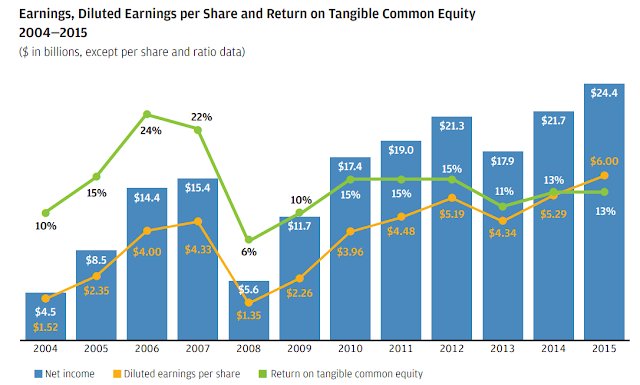

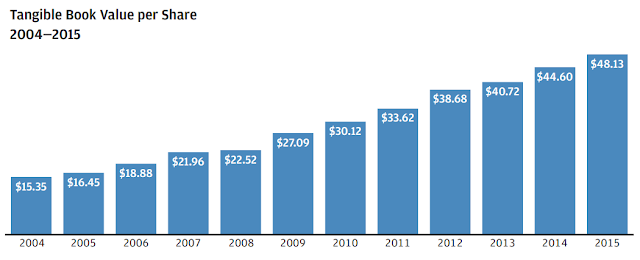
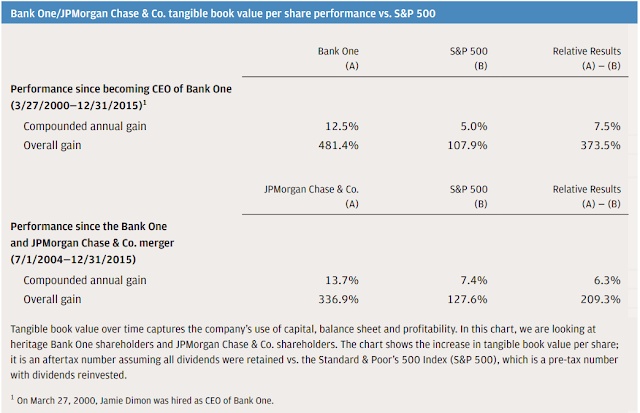
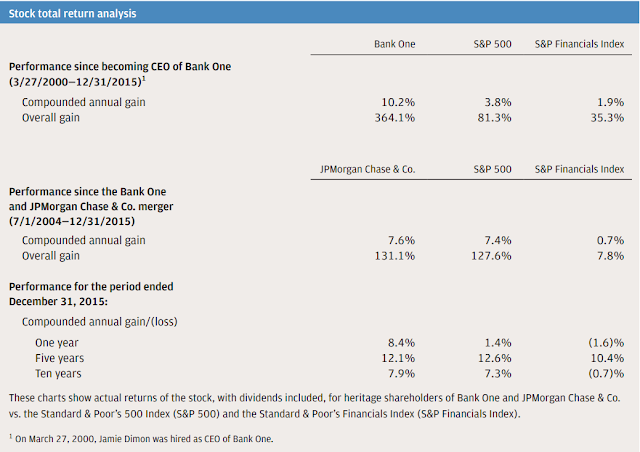
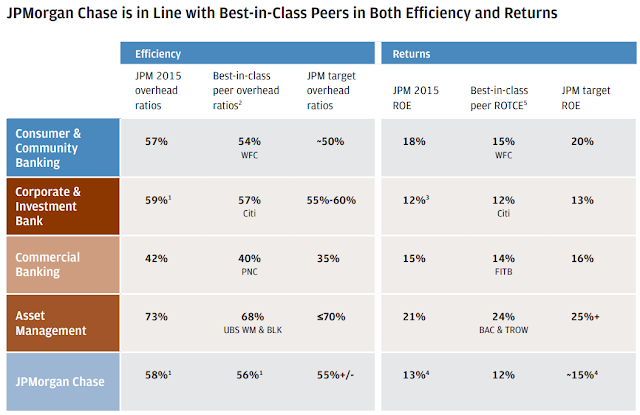
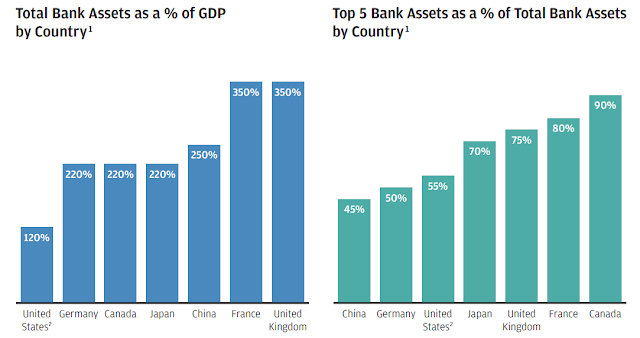
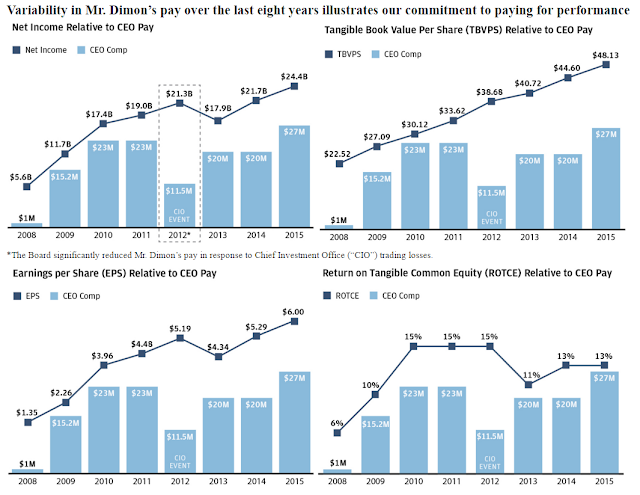
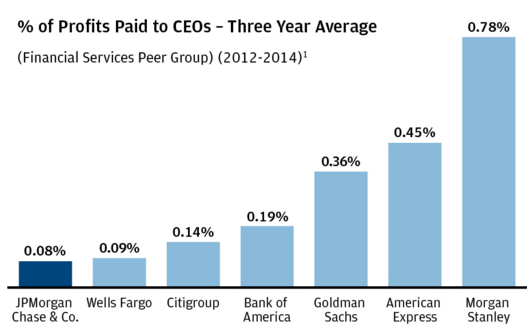
Welcome back!
JPM is the poster boy for why the big banks should be broken up. The London Whale fiasco, while itself not life-threatening, is the one cockroach that signals there are 100 others you can't see. If their financial controls were not sufficient to prevent that, then what happens when things really get dicey? A commercial bank attached to tens of trillions in derivative exposure? That's just tremendously poor regulation. There's literally no socially beneficial reason to have banks at such scale and literally dozens of reasons not to. The bank's business will look just peachy until it all crumbles. And when the government decides to call the market's bluff (as it did on Lehman Bros.)? JPM is done. Do you want to own a bank whose survival during a crisis depends on the whim of a government official? And Jamie Dimon is just kind of the arrogant blowhard it will happen to, because he (and others) refuse to see the social detriment that the big banks by virtue of being big foist on the public and other companies. As an investor, I stay far away from these kinds of companies.
Thanks for dropping by, and thanks for the opinion. Your view is the consensus, I think. Even my closest friends and family members say the same thing, but I disagree. I started this blog back in 2011 during all that Occupy Wall Street stuff, and I was compelled to say something, leaning the other way.
So anyway, I don't want to go in circles. Your opinion is duly noted. 🙂
Great to see you posting again!
you don't think there's an agent problem when th investment bank can sell bonds to its clients client and then turn arounds and short those bonds?
No, not at all. whether stock or bond, when a firm underwrites it, they often end up making markets in it. When you make markets in something, you can either be long or short depending on the exposure of the total book, supply/demand etc. It's only a problem if there is undisclosed information that the dealer knows (inside information) that the client doesn't etc. that it may be a problem. It might not be a problem if the information is not material.
Looks promising 🙂
Welcome back!
In Switzerland (in the old days?) they would immediately put a bank CEO in jail if his bank failed.
This too-big-to-fail is kind of a myth. If any large bank is going to fail (remember Continental Illinois?) the government will find a way to bail it out. We have developed societies around the world that can no longer tolerate any failure, or even any temporary pain.
Greed will ultimately corrupt. A corporate culture that values $$ and make 20 somethings millionaire has to be regulated. Jamie Dimon may be a superstar but he can't micromanage JPM. Without legislation, a rogue investor or an irrational equity market may bankrupt financial companies with viable business models due to their leveraged balance sheet. It boils down to the governments and how much risk they want their financial institutes to take on. Regulation is required and desirable for all parties involved.
Nobody is against regulation. Dimon has said many times that it's not about regulation or no regulation. It's about good regulation that works versus just more regulation (to make things more complicated and ineffective).
As for $$ and culture, I used to think that too. But more $$ seems to be made these days in the valley than in finance.
Regulation is needed just about everywhere, not just where $$ is the culture. Nuclear energy, for example, obviously need extensive regulation. So do food companies, pharma and many other businesses that involve public health, etc…
As for $$/corruption/regulation, I find Japan a fascinating example. Japanese companies do not pay their employees like American companies. Not even close. And yet the biggest financial bubble/collapse happened there in the late 1980's. I think the CEO's at the top banks/brokerage firms made less than $1 mn. Glass-Steagall (or their equivalent) was still in effect so banks and brokers were separate. They didn't have a lot of derivatives either.
And yet, they had the most spectacular blowup in history that they are STILL trying to recover from. Go figure.
So it's not so simple, I don't think.
Maybe this is a separate post, but in my view, I think the best way to make the financial system stronger is to simply regulate the end-products.
I still think the biggest factor in the financial crisis was nothing down loans to unworthy credits. Yes, Wall Street helped make those possible via securitizations, but at the end of the day, it's the bad loans that were made that blew this country up.
And then after the crisis, it turns out that the FHA was still making loans with 2.5% down. I was like, wtf? They are trying to bulk up capital standards at banks and yet they are making 2.5% down loans?!
Think about why there has been no financial crisis caused by the stock market in recent years. It may have helped cause the great depression in the 1930's.
But in the stock market, you can't lever up more than 2x. You have to put up 50% to buy stock on margin. This is why when black monday happened, or 2000-2002 bear market, we were pretty much OK.
Yes, hedge funds can lever up more, but prime brokers required mark-to-market and cash collateral on a daily basis.
This is not true for the loans that blew up in the financial crisis.
Anyway, this is too long to put in a comment so maybe I'll get back to it as a topic in a future post…
Oh, and I forgot to follow up on my Japan idea. People always talk about the greed caused by CEO compensation (stock options, bonuses) and that leading to misbehavior. I used to buy into that too.
But then I scratch my head watching Japan. Look at the fiasco of Tokyo Electric Power before, during and after the 3/11 disaster (tsunami, nuclear meltdown). TEPCO is a regulated utility with medicore paying jobs. No incentive to act greedily or irresponsibly.
What about Olympus? That was baffling too. Takata and their airbags is totally inexcusable. They should be shut down and all airbags recalled and destroyed. If Takata was a U.S. company, people would be saying that it's all about CEO greed. And yet, this is happening in a culture that is very different than in the U.S.
I can go on and on. You can see all the same things that happen here happening over there. So this CEO greed and all that stuff doesn't really explain a whole lot (if the same problems/scandals happen in other cultures). There is obviously something else going on here…
Anyway, I don't have the answers, but it's a fascinating thing to talk about. It's too easy to see this or that happen and then just point to a greedy CEO (or whatever else you want to point to).
A few random thoughts regarding your thoughts about corruption and regulation.
I would say that there are several drivers/effects. CEO greed is one possible explanation imo but not a necessary one. Take Volkswagen as an example. The engineers who designed and wrote the defeat software were (probably) not greedy and did not have any financial incentives (probably). Instead they were simply scared to the report a failure to their management in a company where failure is not an option. So I would say incentives matter, but it is not just money.
Regulating the products would be a big step in the right direction. I would say that no retail client needs CFDs, for example. If you want to gamble go to Vegas, drinks are free there and the service is better. Imo all products that involve leverage should not be sold to retail clients. Leverage amplifies results but doesn’t make a bad idea a good one. Let the pros blow themselves up if they feel inclined to do so but at least they should know what they are doing. There are enough ways to invest and speculate already.
Have you seen this article in Morningstar on Markel and Berkshire? Right up your alley.
Berkshire's a Good Insurance Operator but …
Hi, yes, I read that. Nothing new there, mostly a matter of opinion, I think. The author thinks that the only moat possible is on the underwriting side and not on the investment side, which I obviously disagree with. He says the non-insurance operating companies is a failure too, but my view is that it's still very early days in that area. Four years is not much data.
He says the reinsurance business is a terrible business, which is true at the moment, and may well be for a long time. But what makes reinsurance interesting to both BRK and MKL has been, not so much the business itself, but how they conduct the business that is different than others. I think the author misses that key point too.
He misses the fact that what makes BRK and MKL interesting is that they have more levers to pull in terms of capital allocation; if the reinsurance pricing is bad, don't allocated capital there; invest in a stock, bond or an operating business etc.
There wasn't, I don't think, a discussion about that.
I don't understand the 'risk-assumptive' versus 'value-creating' (or whatever terms he used). They are always together; you can't have one without the other.
The equity allocation of MKL has been stress-tested in the real world with some serious bear markets in the decades they have been in existence. I think they have proven their ability to add value.
But anyway, again, this is all just a lot of opinion so hard to argue…
Oh, and I forgot to mention, owning bonds at this point may be even riskier than owning stocks. Most people seem to think that bonds are risk free as they are 'fixed income' investments. But if rates go up, bonds/bonds funds will decline dramatically. Many people will be shocked. Bonds with their current yields is the perfect example of non-value-creating-risk-assumption, or as Jim Grant used to say, return-free risk (I think that's what he said).
Also, a lot of us here don't define risk the way academics do. Conventional risk is volatility, but we here don't really care about volatility. Real risk is permanent impairment of capital… Again, these issues were never raised or considered in the above report.
kk, not sure how to contact you otherwise, but just wondering if you noticed Stiritz bought 750K shares of POST in early February for a total of about $41.25MM, and if you have/had any further thoughts about POST based on this? *Thanks* for this blog — it's so refreshing!
No, I didn't notice that, but that's great news as he has historically been really good at timing purchases of his own stock. I wouldn't have anything to add other than that…
Good to see you again!
Tables showing long-term performance are great. I thought it was noteworthy that the new LUK executives decided to omit the long-term performance table that Cumming and Steinberg included in every letter, and actually don't even include the book value per share figures anywhere in their letters, even though they refer to it as an important measuring stick. It is no surprise that this figure is flat for going on 5 years.
Such a informative information are share here. It really very effective and beneficial for us. The inflation rate for the finance situations.
Stock Finance Services Australia
kk – An interesting topic would be to ask whether breaking up the banks is bad for shareholders.. If JP Morgan or Wells Fargo "break – up", would shareholders lose value?.. or would it be more akin to the Standard Oil or AT&T break up, where the parts turn out to be more valuable than the whole? I've not seen a proper analysis on this but it'd be a great topic to look at and study. If there are any studies out there on this, I'd love to hear of them.
Hi, there is some discussion in the proxy statement which was filed recently. Also, go to the JPM website and look at the investor day presentations over the past couple of years and there is discussion/info about the benefits of JPM staying together. Those are good places to start.
Even before that, people like Michael Price used to advocate for breaking up even investment banks into prop traders/market makers, investment bankers and asset managers. The argument was that prop traders should be valued at book, investment bankers, judging from the boutique investment banks listed on the stock market, could be valued at 30-40x p/e and asset managers were typically trading at 20x p/e.
But I never really bought into that argument because they often can't exist on their own. For example, the investment bank might get an IPO deal. The market-making desk would make markets in the stock or bond etc. So they sort of go hand-in-hand. Asset managers got client referrals from the investment bank and private client group etc. So it's hard to just break them up and separate them.
Anyway, I think JPM makes a good case that their model works.
In fact, I have said in the past that GS probably needs to merge with a big bank. Politically, it's probably not going to happen. But look at the ROE at GS compared to the ROE at JPM. When you have multiple streams of income, there is a diversification effect/benefit.
On a tangent, I saw someone saying on TV yet again how banks privatize profits and then when things go bad, the tax-payer foots the bill. People keep saying this but it's totally false.
For example, the FDIC is supposed to be self-funding; no tax payer should cover industry losses. I don't have figures handy now, but when the FDIC takes a big hit, the FDIC insurance rate goes up and banks pay back into it so over time the industry pays for it's own blowups. As for TARP, most banks have paid it back with interest, so the tax payer didn't 'foot the bill'. The only one who may not have paid back is AIG or FNM, but I think they have since paid everything back.
So in that sense, yeah, TARP shouldn't happen, but I think it's OK to happen in crisis/emergency situations. And I think it's fine for the industry to pay tax payers back vie preferreds or higher FDIC rates or whatever.
Anyway, that's sort of another issue, (and sort of a pet peeve of mine, lol…).
So start there; the JPM proxy and investor day presentations.
kk, thanks for the response! I do read the JPM investor day presentations and those of other banks.. I'm convinced that big banks staying together is probably* the most appropriate path forward. I think proponents of splitting them up should be careful what they wish for.. But I guess what I'm getting at is, as investors, we have to think through and be aware of possibilities. In light of that, let me reword my query..
Just as there are lollapalooza's in business, with forces moving all in one direction, history tells us that populism and public sentiment can pick up and move forward in a self reinforcing way. So, we have to accept that sometimes industry suffers from negative popular sentiment, despite the facts being on our side. We have to accept the reality of the world, even if the world is unfair! If banks "breaking up" has a bad outcome for shareholders, we have to factor that into our probabilities, even if unlikely. If we have done an analysis that shows it wouldn't be so bad after all, then we can make investment decisions on the banks with more comfort.. Am I making any sense?
Yeah, I see your point. Frankly, I haven't put much thought to it. These things take a lot of time. Even if they decide something, they will usually have years to comply. They won't say that the company has to be split by the end of the year or anything like that.
I think this bank bashing is getting really stale and old, even if it's just election rhetoric. People tend to like to fight the last battle. Plus the Met life case is interesting (overturned TBTF).
Politicians will say all sorts of things, but at the end of the day, to get the deal done will take a lot more than just grandstanding.
If things do move in that direction and somehow banks do have to break up, then I'm sure JPM will do it in a way that doesn't destroy shareholder value. Maybe they sell off some parts if the parts are not strong enough to stand on their own (for example, I may be wrong, but I think asset management gets a lot of their assets through the whole group; they are not a Fidelity).
If all the banks have to break up, then maybe there will be horizontal mergers, who knows.
But either way, I don't think it will happen quickly, and I don't think it would happen in a value destructive way. But who knows, really.
Good points. And a reason to pick banks with superior management teams to navigate these possibilities. Thanks for taking the time to respond.
First, pardon being off-topic. I've just come across your blog. Great stuff. I sometimes look for industries going through fundamental shifts, for better or worse. One of them today I think (unfortunately for worse) is the active money management biz. Since you've written about value investing and at least one firm, I want to bounce the idea to solicit your thoughts.
It seems its long-term cycle of top-line growth and margin expansion may be petering out. Some of the companies look cheap and have been buying back stock. I'm beginning to suspect many may also be value traps. Buffett has been in the Bogle camp for some time now so it doesn't seem a passing fad.
Any thoughts? Have you read any good shareholder letters that address this head-on? Thanks.
Hmm… very good question. This is really a tough issue as everyone seems to be having a hard time, and we don't know if and when interest rates will normalize. I have always sort of been on the side of lower for longer (follow Japan), so that's a concern for asset managers.
First of all, my basic view is that all of this stuff is very cyclical. Active management is hot for a while, then indexing gets popular, then you have a bear market and then alternatives/hedge funds get hot. Then they peter out and people go back to index funds.. index returns lag, and some funds start to outperform and active gets popular again.
So this just goes through cycles over time, so as much as people say hedge funds are dead, private equity is dead, or active investing is dead, I totally disagree and just think those sectors are in down-cycles.
I would guess that over the longer term, a basket of asset managers bought cheaply will do well.
Great shareholder letters to read about this issue… hmm… Larry Fink of Blackrock writes a great letter. If you are interested in asset managers, I would just read the annual report of all of the managers that interest you. There aren't that many so won't take too much time.
As for asset management in general, the Blackstone conference calls are very enlightening/ educational. Schwarzman goes out of his way to answer all questions and explains stuff in detail.
Thanks for dropping by…
Thanks for the thoughtful response. The references are appreciated.
This may be a matter of opinion. I think though that the money management biz is undergoing a secular, fundamental shift and that the last few decades may have been unusually good to it. I'm thinking that Taleb's "Fooled by Randomness" could apply here, not in terms of investment performances but fund advisors' economics. Demographics and new regulations don't seem to favor active managers.
I think higher interest rates may give some relief to some managers of money market and longer-term credit funds. I look at Franklin Resources's performance last several years with operating margins averaging ~37% (better than Apple, Alphabet / Google, Microsoft or Accenture), 50% pre-tax RoA while retaining ~75% of earnings and wonder whether low rates and the gusher of money from the Fed have been a benefit or detriment. If higher rates pose a relief, it seems it's questionable how long that relief would continue if adverse changes of investor preferences, demographics and regulations are secular.
I suspect many big active management shops may revert to pre-'80s economics before the biz got exciting with fund celebrities such as Lynch, Templeton, Gross, etc. The "everyman an investor" phenomena in the US and the UK really have been flourishing for just a few decades. Commoditization seems to be taking place now via index mutual funds and ETFs. Most of the active managers are wholesalers that don't have direct salesforces like retail brokerage firms (which are barely growing in a bull market if BAC's and MS's wealth management units' non-interest incomes are indicative). Recent regulations may hurt opportunities to merge for distribution.
I admit that I may be wrong and have sought contrary opinion. I however have a hard time seeing how the industry's future will be nearly as bright as its last three-plus decades. Reversion to historical means looks more likely. It's a space worth watching.
Thanks again.
Very good points. A lot of things won't be nearly as good as the past 30+ years but it can be good, though. I also observe the same patterns you do. Now, it's even accelerating with robo-advisors and automated asset allocation (or whatever buzzword they use, I forget at the moment).
But sometimes it's hard to see how these things pan out. A great example is the simple brokerage business. After commission deregulation, it was hard to believe people still used full-service brokerages after a bunch of discount brokers popped up. But wealth management (as it' called now) has done very well since then. Internet brokerages took commissions down even lower, and yet both discount brokers and full-service wealth managers keep doing well.
Sure, the discount brokers had higher growth rates than wealth managers, and then internet brokers had higher growth than discount brokers, but they all seem to do well in their respective categories.
Logic would suggest the new thing keeps replacing the older, but that really isn't the way it has worked out, I don't think. The new things do take market share, of course, as they start at zero market share.
Asset management have their cycles too. Efficient market theory was very popular in the 80's too. These trends do come and go.
Anyway, I don't know how all of this will pan out, but it will be interesting to watch.
At some point, when everyone runs to indexing, the market will be so mispriced that active managers will start to do well again. But we'll see…
oops, actually robo-advisor is probably what i was thinking about for automatic asset allocation… doh…
Regarding robo advisory and other methods of… let’s call it computer aided asset allocation I think this is one of the more overhyped concepts as of lately. What I have seen so far boils down to a simple formula that says you should allocate x% to ETF A, y% to ETF B and so on. Which is probably good enough for the typical Joe Retail. Shifting portfolio allocations all the time does more harm than good, so a simple mechanism to stop that should provide some additional return (at least in the form of lower fees). It might be better than the usual indexing approach, otoh you can construct such a portfolio yourself. You just need some discipline not to fiddle around all the time.
I think you nailed it when you said that asset management has it’s cycles. Active vs passive, back and forth. I don’t think the latest „innovations“ bring anything new to the table. Not yet at least.
Great Post, I have often felt that the criticism from the mainstream towards certain banks is unjust and some of the conventional wisdom about the 2008 financial crisis seems misguided. However after every bubble and burst the financial industry always faces mainstream disdain for many years thereafter. Banks are not too big to fail and I think the media has gone running for the best story (as it should).
I agree strongly that there should be more CEO payment structures aligned to success of the firm like Jamie Dimons. Dick Fuld said in one of the Bankruptcy hearings, "When the bank did well, I did really well. When the bank didn't do well, I did not do well" (That is definitely not true in his case at least).
Banks are not TBTF and it the Occupy Wall Street, Banksters, Anti-Financial Industry is now just a washed up cliche, overused by the media and really quite meaningless now (rather sad that this happens so often now). What I do believe strongly in is that Banks and the financial industry in general works towards enlightening conventional wisdom because an often disregarded fact that became prevalent in 2008 was how the average middle-class taxpayer perceives banks. Alot of people are still in the dark about Economics, Capitalism and the stock market in general.
The better public relations with the average person the better the conventional wisdom turns to true facts, and in that way it would be a win win scenario for banks and the financial industry in general.
What do you think about these things? Great Post as always btw.
I agree. One of the reasons I started this blog is to take a contrarian stand against all this anti-bank, anti-capitalistic sentiment back in 2011. This was around the time of Occupy Wall Street.
There is not much more we can do. Dimon is doing a great job with his annual letters explaining his views in great detail. Blankfein has also said he needs to get out there more and explain what they are doing; that GS has underappreciated the importance of public relations etc.
But this hatred against bankers is nothing new and it always seems to be this way. A lot of anti-semitism seems to be anti-bank-related, especially in the early 20th century, for example.
Bankers versus the people is a theme that goes back to Hamilton and Jefferson in the U.S.
With no new ideas and plans, politicians just take the easy way out and point fingers. That won't ever change, unfortunately.
Anyway, thanks for reading. I gotta get back to more regular posting here…